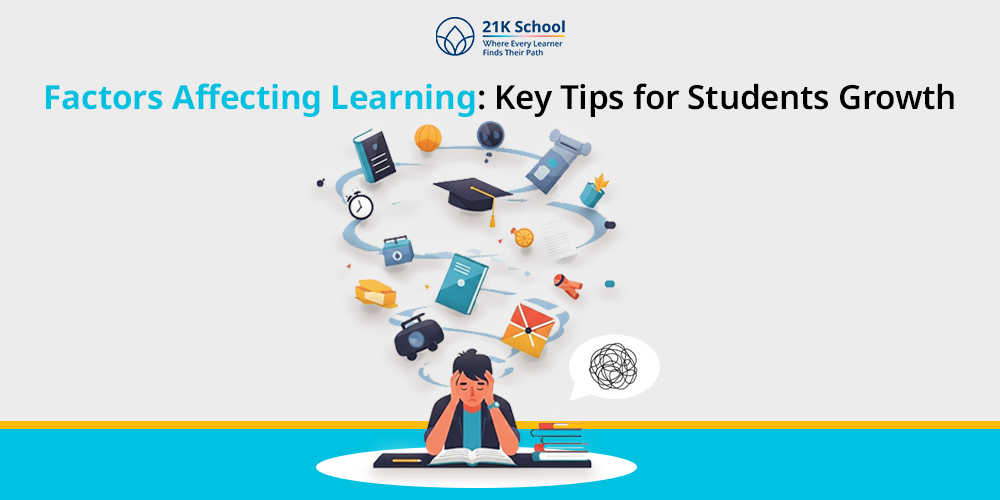
Education is one of the crucial parts of a learner’s life. Continuous learning from preschool to higher education is the foundation of academic and personal growth.
When first time kids step into the classroom there are multiple factors affecting learning.
The factors affecting learning include various sub-categories such as psychological, biological, environmental, cultural, and even technological factors.
But have you ever thought about why these critical factors play a critical role in shaping learning outcomes?
By understanding each factor in detail, learners, facilitators and parents can identify the challenge and figure out ideal solutions. Let’s understand major factors affecting learning in detail.
Contents
What Are the Factors that Affect Learning?

Factors affecting learning mean conditions or environments which can impact student learning in both internal and external ways.
Internal factors affecting learning include motivation, health or intelligence. While external factors such as classroom learning environment, social influence and technology in education .
To make learning more effective and enjoyable one must strengthen these areas. Factors affecting learning are categorised in various forms which we will explore further.
Major Factors Affecting Learning
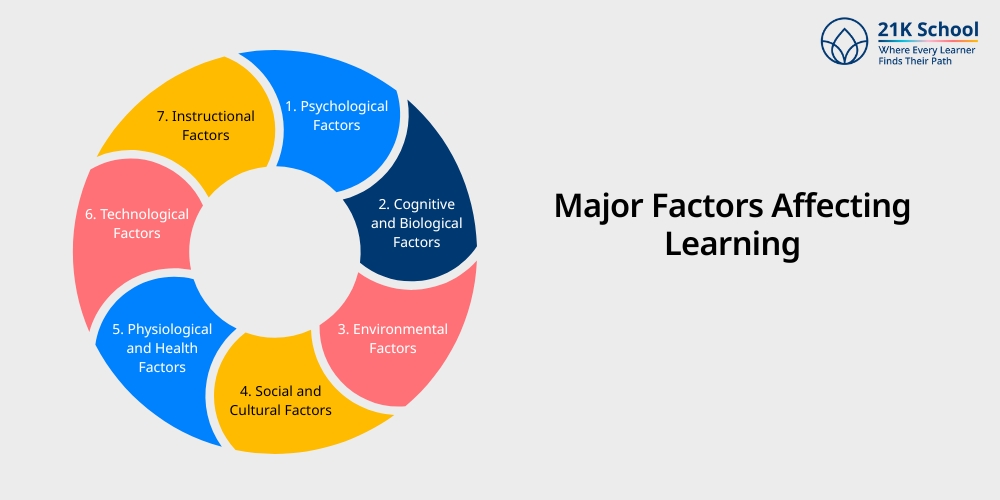
There are many factors affecting the learning of students such as environmental factors, instructional factors, psychological factors, cognitive factors etc.
Given below are some common factors one must know:
1. Psychological Factors
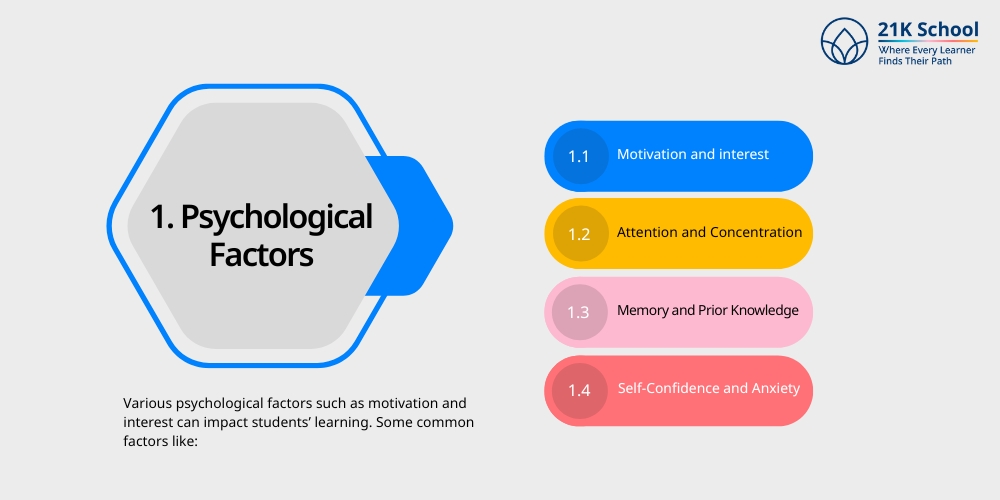
Various psychological factors such as motivation and interest can impact students’ learning. Some common factors like:
1.1 Motivation and interest
Motivation is one of the strongest pillars in learning where individual interest in a particular subject ensures their activeness and curiosity while learning.
This increases their interest to explore more and retain the maximum knowledge. Motivation is not because of pressure but due to meaningful learning.
Facilitators can connect subjects with lessons to guide in real life situations.
1.2 Attention and Concentration
Without attention in the classroom and concentration in learning , learners can’t achieve desired goals. Distraction, lack of interest or multi-tasking can impact concentration.
As a parent at home and facilitator at the classroom, it’s important to provide a positive learning environment for learners.
1.3 Memory and Prior Knowledge
Daily learning and practice improve learners’ existing knowledge. This means prior knowledge is work as a foundation or base information.
Remember, weak memory or lack of knowledge can make learning harder in higher education.
Facilitators should revise the foundational points as a quick overview before starting the chapter to interlink present and prior knowledge.
1.4 Self-Confidence and Anxiety
Confidence helps learners to try multiple times even if there is a failure. Facing challenges with strength helps them to reduce anxiety or exam stress .
To reduce the fear of failure or exam stress parents and facilitators should motivate learners, guide them to reduce anxiety and celebrate small wins to make them confident.
2. Cognitive and Biological Factors
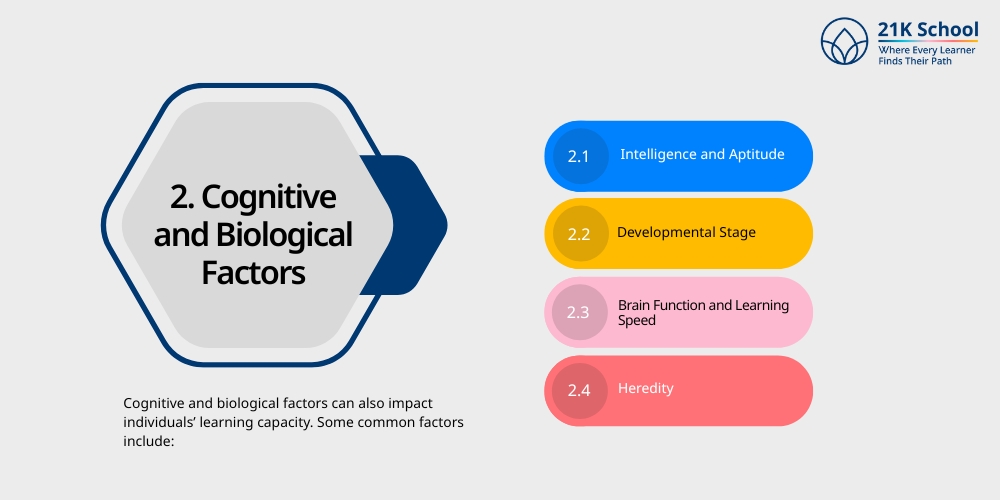
Cognitive and biological factors can also impact individuals’ learning capacity. Some common factors include:
2.1 Intelligence and Aptitude
Each student is different in their level of intelligence and aptitude.
Some have high logical reasoning while others are good at creative thinking skills and language proficiency.
By exploring child interest and strength, facilitators and parents can increase support to succeed.
2.2 Developmental Stage
From a very young age kids develop various skills that help them in learning. Different stages of development ensure connection, coordination and retention.
In each stage of development using different and appropriate teaching methods can improve learning.
2.3 Brain Function and Learning Speed
As we know each individual is different from each other. That’s why some are quick learners while others slow learners .
Brain functioning and learning speed plays an important role in children’s education, especially in higher education.
Facilitators need to use differentiated learning or instruction to meet the needs of each learner effectively.
2.4 Heredity
Some learning challenges or difficulties are inherited such as reading issues from generations, learning difficulties like dyslexia.
Parents and facilitators should analyse children’s ability especially in hereditary cases. It helps learners to get the right education with fewer problems.
3. Environmental Factors
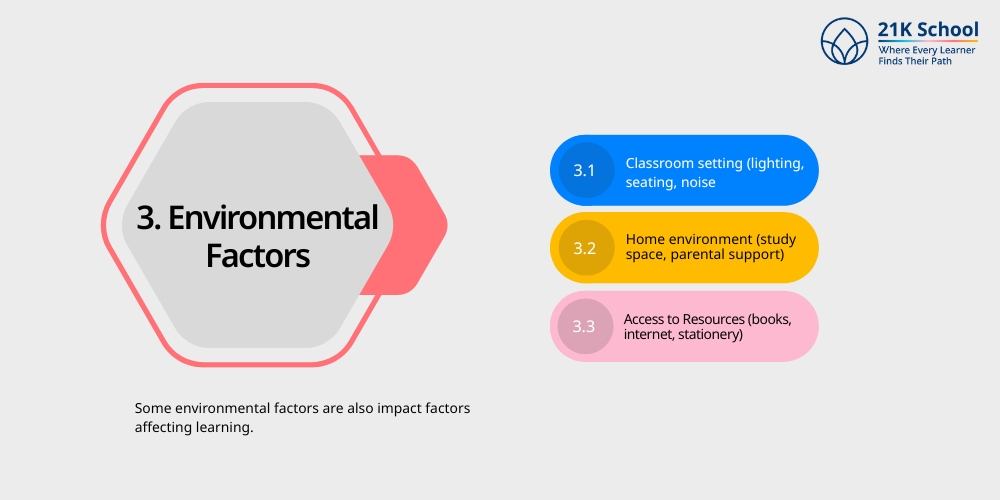
Some environmental factors are also impact factors affecting learning.
3.1 Classroom setting (lighting, seating, noise)
Poor seating arrangement, noise and distraction can impact learning. For effective learning one must have a peaceful and comfortable setting including study table, lights and study timetable .
Both school and home learning environments should be positive and engaging.
3.2 Home environment (study space, parental support)
After school home is the next best place where kids can peacefully learn without distractions. Distractions can adversely affect learning.
Parents should provide a quiet place only for study and support the learner by providing needful elements.
3.3 Access to Resources (books, internet, stationery)
Less availability of resources like books, internet, stationery can limit the growth of students. The right material at the right time ensures smooth learning.
Parents and school should prepare all the needful resources or elements early.
4. Social and Cultural Factors
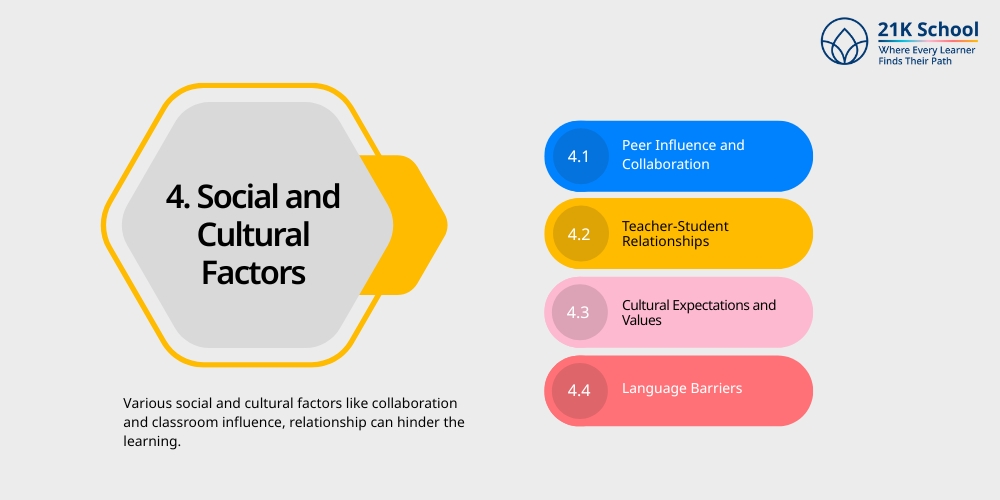
Various social and cultural factors like collaboration and classroom influence, relationship can hinder the learning.
4.1 Peer Influence and Collaboration
Peer influence and collaboration can improve learning experience and environment. Through group study or positive peer support one can achieve good marks in exams .
Different educational activities offered by school and facilitators can improve connection and collaboration between peers.
4.2 Teacher-Student Relationships
The relationship between teacher and student becomes complicated where students share all doubts related to academic or personal.
To comfort students, teachers should share their opinions, feedback and clear all doubts to improve bond.
4.3 Cultural Expectations and Values
Cultural expectations and values are some of the most important parts to shape learning. Some cultures ensure learning others prioritise creativity, moral values etc.
School should ensure every culture should be taught and valued equally to all learners.
4.4 Language Barriers
Students from different backgrounds or environments have difficulties understanding and retaining knowledge. These individuals become slow learners.
The solution is that teachers should provide bilingual support or visual aids to make learning easier for students who speak different languages.
5. Physiological and Health Factors
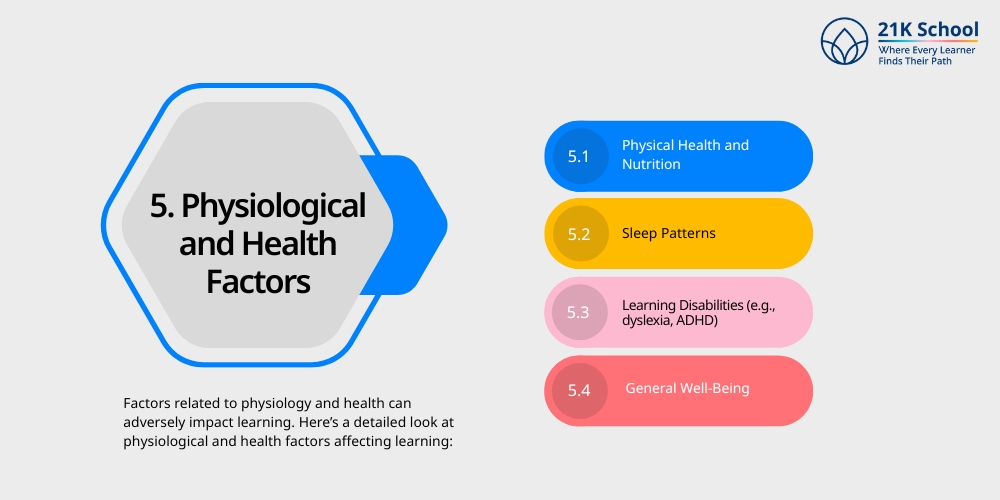
Factors related to physiology and health can adversely impact learning. Here’s a detailed look at physiological and health factors affecting learning:
5.1 Physical Health and Nutrition
Poor health can impact both mental and physical abilities of learners. For effective learning, students should be healthy and strong.
Taking nutritious and home-made protein rich food with daily exercise can be beneficial. Parents should provide a balanced diet to learners every day.
5.2 Sleep Patterns
Sleeping pattern accuracy is one of the most important parts to stay focused and conscious about learning. A tired and sleepy student unable to focus on classroom learning .
5.3 Learning Disabilities (e.g., dyslexia, ADHD)
Education can be challenging for learners with disabilities like dyslexia , ADHD etc. However, with proper information and the right environment they can learn effectively.
Early diagnosis helps parents and schools provide better education and overcome difficulties.
Read on to learn more about learning disabilities .
5.4 General Well-Being
One of the major challenges learners face while learning is emotional and mental health problems. Including stress levels, anxiety can create difficulties.
By promoting mindfulness , relaxation, and a supportive environment for learners well-being leads to academic growth.
6. Technological Factors
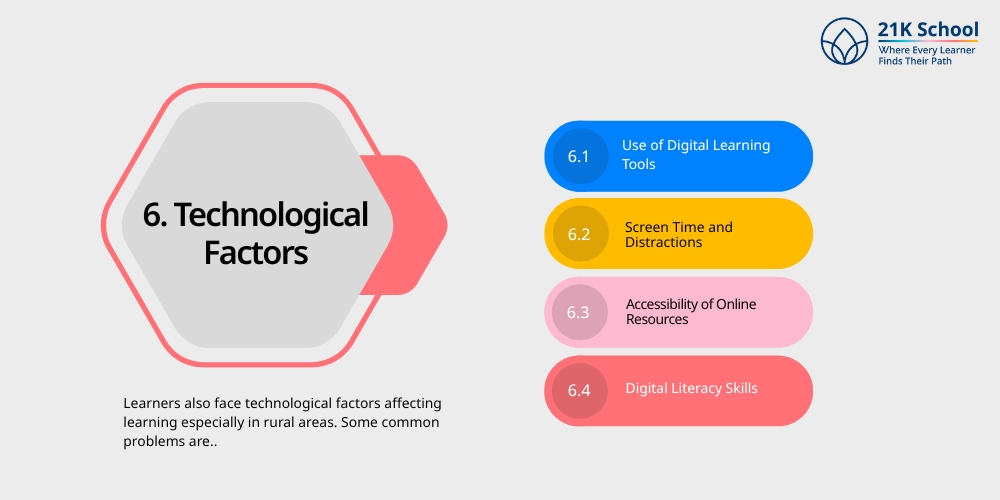
Learners also face technological factors affecting learning especially in rural areas. Some common problems are,
6.1 Use of Digital Learning Tools
To make learning easy and quick use of various digital learning tools related to education or fun learning activities can enhance retention.
Parents and facilitators should introduce various apps and e-learning platforms to explore new things.
6.2 Screen Time and Distractions
Excessive screen time can also reduce the productivity of learners. Make sure both text books and online learning should be balanced and kids aren’t attracted to online platforms.
6.3 Accessibility of Online Resources
Due to various reasons kids are unable to access resources to improve knowledge and retention.
Use of online tools and resources via internet can improve students’ education.
Understand how the internet is beneficial for students .
6.4 Digital Literacy Skills
By introducing technology in education, facilitators can simplify kids’ learning.
Facilitators in the classroom and parents at home can train children to use technology or AI in education effectively.
7. Instructional Factors
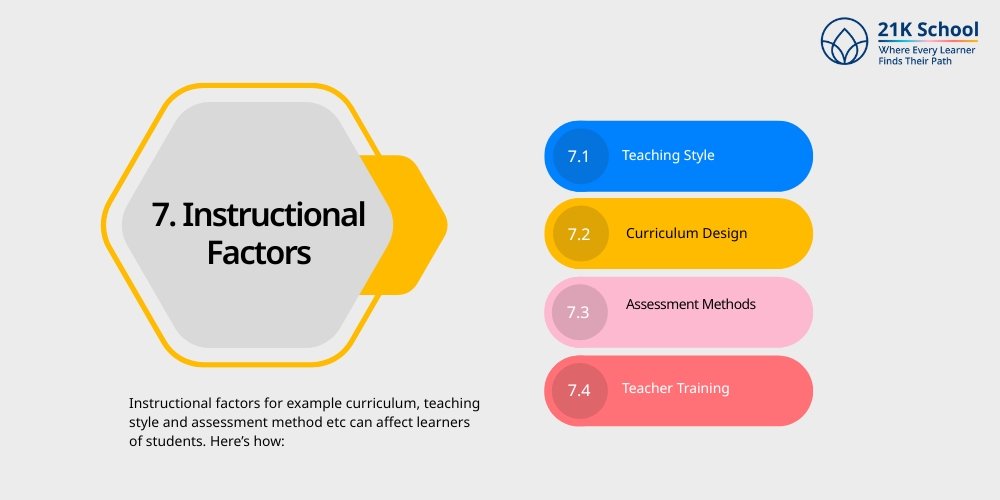
Instructional factors for example curriculum, teaching style and assessment method etc can affect learners of students. Here’s how:
7.1 Teaching Style
Engaging different teaching styles at different grades is important to improve learning.
Interactive, practical, discussion-based and project-based learning are some ideal options. Based on student needs, teachers should adapt the most appropriate style.
7.2 Curriculum Design
Overloaded and outdated curriculum is not effective to achieve good academic marks. Students need a well-structured and updated curriculum .
7.3 Assessment Methods
Implementation of different types of assessment in each grade according to subject and requirements is important for better education.
From Science experiments , to 10-minute tests each teaching technique can influence learning.
7.4 Teacher Training
Teachers with minimal training or not attending training programs leads to negative impact on studies.
Schools must schedule regular training programs to improve the education and training to handle diverse classroom learning.
Tips for Teachers and Parents to Overcome Factors Affecting Learning
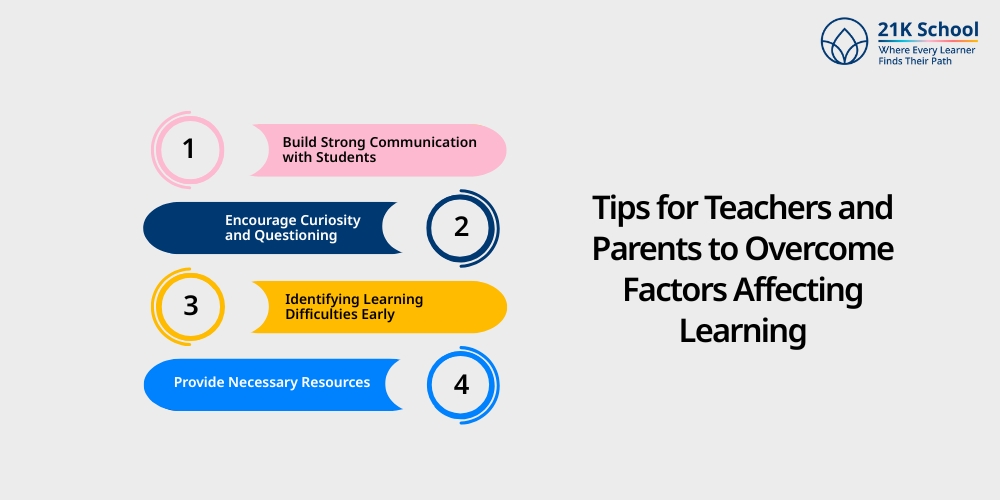
Factors affecting learning is a part of education, however, with some common tips teachers and parents can overcome these problems.
1. Build Strong Communication with Students

By building strong communication with students, parents and teachers can create a supportive learning environment.
To do so, listen to their concerns and provide guidance on how to deal with problems.
2. Encourage Curiosity and Questioning
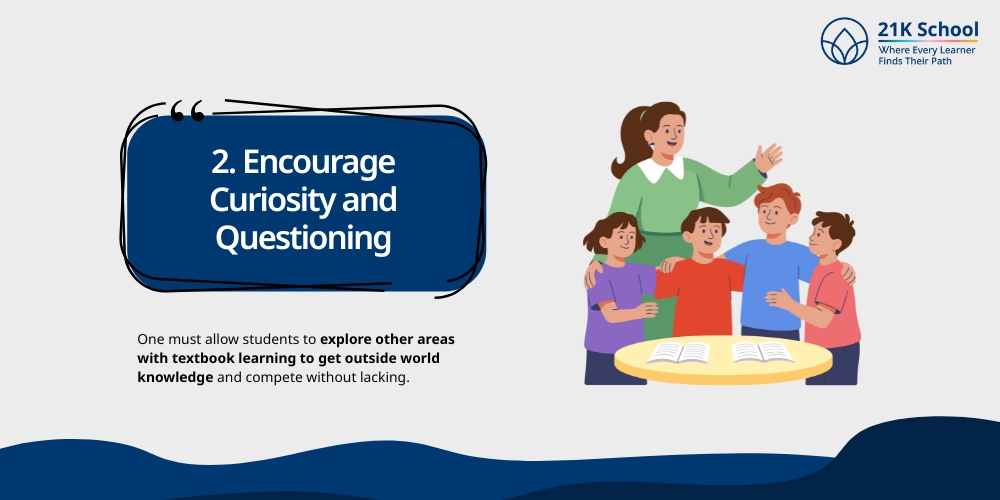
One must allow students to explore other areas with textbook learning to get outside world knowledge and compete without lacking.
This will increase students curiosity , questioning and desire to know more.
3. Identifying Learning Difficulties Early
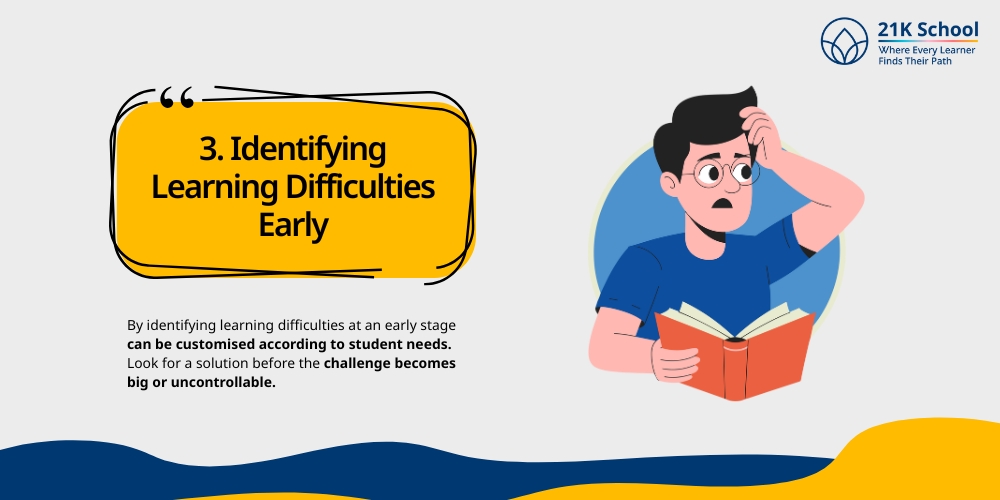
By identifying learning difficulties at an early stage can be customised according to student needs. Look for a solution before the challenge becomes big or uncontrollable.
4. Provide Necessary Resources
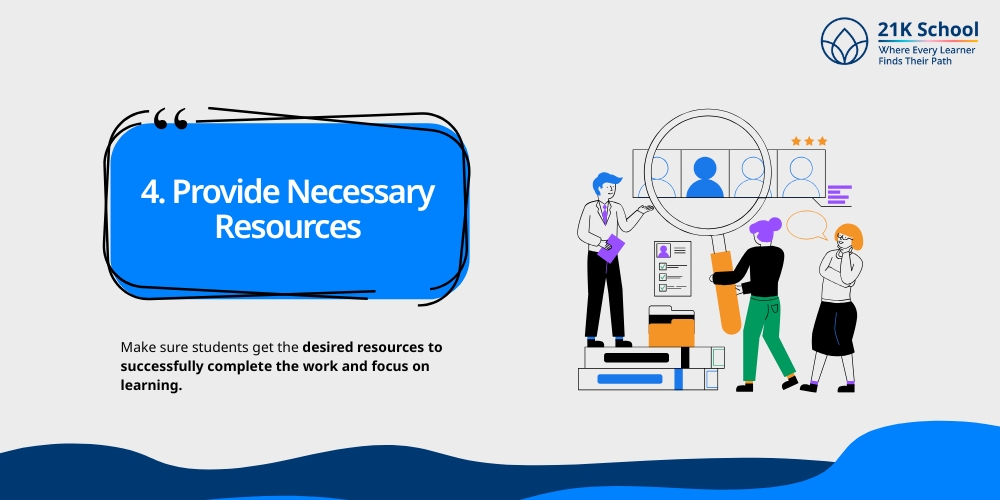
Make sure students get the desired resources to successfully complete the work and focus on learning.
Conclusion
Student learning is not impacted by one factor, there are multiple as mentioned above. For example, psychological, biological, environmental, social, cultural, physiological etc.
Each factor influences the learning capabilities which need to be recognised by parents and teachers to get effective solutions.
One can support, motivate and provide a positive learning environment which leads to high academic performance and personal growth.
Remember, students should be motivated, interested, mentally and physically strong to get the desired results.
